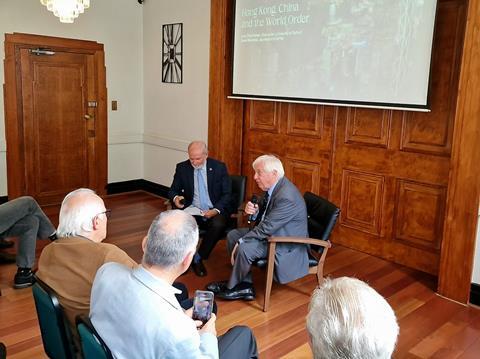Spooks might rate the risk of conflict at 50:50, but Hong Kong’s last British governor used an insurance example to illustrate why Beijing is unlikely to launch a war with Taiwan.
Lord Patten was Hong Kong’s last British governor until its handover to China in 1997, a former UK Conservative minister, and today serves as the chancellor of Oxford University.

On Wednesday, Patten delivered a guest lecture, co-hosted by Regent’s University London and the Association of European Journalists, chaired by David Worsfold, an insurance journalist.
He underlined a position that emphasised China’s domestic challenges, relating to its reneging on ”One country, two systems” for Hong Kong, and in its wider engagement with the West.
Patten also emphasised the “crazy” prospect of war for Taiwan, and that a robust Western policy should “de-risk” some areas, but avoid “de-coupling” in broader economic terms.
Below are some selected passages from his speech.
On post-peak China:
“It’s been true for some time that we’re now dealing with post peak China. It used to be argued that China’s growth was going to make their economy bigger than the United States ‘anytime soon’. ‘Inexorable’? I don’t know if there’s such a word, but it’s proved to be all too exorable.
“Leninism in politics has started to dominate economic policy in China. With Xi Jinping determined to claw back some of the freedom that was picked up by private sector, and to ensure that state-owned enterprises in the sector dominated the Chinese economy, parts of the economy which work less well.
“On the economic side, China has an overhang of debt, more than three times the size of its GDP, which it has real problems of managing. We’ve seen the consequences in the property sector, which has turned into a huge Ponzi scheme. We see problems in local government, which is responsible for so much of the infrastructure.
“There are real problems of indebtedness and a misshapen economy, with insufficient attention to consumption and too much concentration on exports. The Chinese economy has been slowing from 8-9% to 3% if you’re lucky this year. Maybe it’ll be painted to be a bit bigger.
“Unemployment among the young is now sufficiently large for the Chinese, not any longer to publish the figure. Last year was published at about 10%. This year is clearly higher, and the consumer satisfaction index has plummeted. So the economy is no longer in a position where it’s roaring past the rest of us…
“People have been for years saying that China would become old before it became rich. And I think that is true. Chinese demography is a horror story. The population is ageing, with far more people of working age in the economy in India than in China, and the position gets worse.
“The figure that would concern me most is the gender imbalance, which increases year by year. The gender imbalance in the 10 to 20 year age group is 16%. Think through what that means for the future, for fertility rates in the future.”
On China-Taiwan
“The assumption was that the Chinese Communist Party would secure and retain its moral authority in government by making people better off year-on-year and by allowing them to do their own thing. Covid finished that with those tremendous lockdowns, and with the attacks on high-tech companies in the private sector. If that is no longer available for the government, what’s left?
“The real worry is about an increase in nationalist fervour. Which is why I think there are more people who are bothered with China’s attitude towards Taiwan today than in the past. I used to think that our spooks are very good on China at MI6. They were clear that they didn’t believe China would invade. I’m not sure that the ones I know would take that view now; I think they think it’s 50:50.
“I don’t think it’ll happen. You’d be uniquely crazy, if you’re one of the Chinese leaders, to go ahead with it. That’s not just because of the military difficulties, but because of the economic issues involved. Take one rather small and obvious example: what would be the insurance charges for carrying freight up and down the Taiwan Straits if there was a war? It’d be impossible.
“I still have enough faith in the intelligence of Chinese leadership think that they’ll leave Taiwan well alone. They may continue to make noise, and stamp, just as with the rest of us. And you know what we should do occasionally? We should stamp back. I don’t think we should be decoupling from China, but I think to use the jargon, we should be de-risking, because there were some areas where you can be far too dependent.”
On Xi’s dictatorship:
“One reason why dictatorships never end well is because the people who surround the Emperor only tell him what he wants to hear. There’s a remarkable passage in Confucius, which makes that point, saying that the most dangerous thing a leader can do is to listen to his closest advisor when they’re telling him what’s clearly nonsense.
“In 2012 2013, Xi Jinping issued an instruction to all the government and party cadres that they should engage in intense struggle against neoliberal economics, parliamentary democracy and freedom of speech. They listed all these things that in a way represented the Hong Kong system, as well as the way in which the liberal democracies do business.
“From the outset, it is drivel to say that the rest of the world has always regarded China as a threat – and some of its behaviour is threatening. Xi’s Communist Party always regarded the rest of us as a threat; a threat to the ability of the Chinese Communist Party to stay in power. The main consideration of the Chinese Communist Party, and its main foreign policy, is that whatever it does helps to sustain its position and authority.”










No comments yet